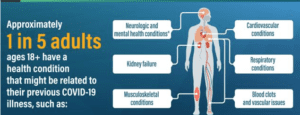Statistically, there’s a good chance we know somebody who has experienced Long COVID, the name for chronic symptoms including fatigue, brain fog, and pain following a case of COVID-19. About 14% of U.S. adults report having had Long COVID at some point.
But many people don’t realize that other viruses, even very common ones, can trigger similarly long-lasting and debilitating symptoms. A study published Dec. 14 in The Lancet Infectious Diseases focuses on the risk of developing “Long flu” after a severe case of influenza.
“We learned from COVID-19 that infections that are initially thought to cause only acute illnesses can cause chronic disease,” says co-author Dr. Ziyad Al-Aly, chief of research and development at the Veterans Affairs St. Louis Health Care System and a clinical epidemiologist at Washington University in St. Louis. That’s true of influenza as well, the new research shows.
Al-Aly and his colleagues used records from the U.S. Department of Veterans Affairs to compare the long-term health outcomes of about 11,000 people hospitalized with influenza from 2015 to 2019 with those of about 81,000 people hospitalized with COVID-19 from 2020 to 2022. The researchers tracked how many people went on to develop any of 94 health risks associated with the two viruses in the year and a half after they were hospitalized.
While some of the symptoms of long Covid and long colds overlapped, the study noted that people with long Covid were more likely to continue to experience light headedness, dizziness and problems with taste and smell; lingering long cold symptoms were more likely to include coughing, stomach pain and diarrhoea.
Covid Caused Chronic Symptoms Too
“We learned from COVID-19 that infections that are initially thought to cause only acute illnesses can cause chronic disease,” says co-author Dr. Ziyad Al-Aly, chief of research and development at the Veterans Affairs St. Louis Health Care System and a clinical epidemiologist at Washington University in St. Louis. That’s true of influenza as well, the new research shows.

Al-Aly and his colleagues used records from the U.S. Department of Veterans Affairs to compare the long-term health outcomes of about 11,000 people hospitalized with influenza from 2015 to 2019 with those of about 81,000 people hospitalized with COVID-19 from 2020 to 2022. The researchers tracked how many people went on to develop any of 94 health risks associated with the two viruses in the year and a half after they were hospitalized.
Experts said the new research could help shine a light on the types of long-lasting symptoms that come after recovery from an illness, including chronic fatigue syndrome.
“These syndromes are not a new phenomenon, but existing research has largely focused on people who survived a severe infection, often having been hospitalized,” said the lead author, Giulia Vivaldi, a statistician and epidemiologist at Queen Mary University in London. “The emergence of long Covid has shown us that people can be burdened with long-lasting symptoms regardless of the severity of their own infection, and our findings suggest that this may not be unique to SARS-CoV-2.”
A study published this year found that the percentage of patients who developed a “long flu” syndrome after having caught influenza was similar to that of patients who developed long Covid after SARS-CoV-2 infections.
It’s not yet clear why some people develop long-lasting symptoms after infections, Vivaldi said in an email. The study suggests that more severe illness — whether from Covid or other respiratory infections — can increase a person’s risk of long illness. But, she added, “we know that this isn’t the only driver of risk in long Covid, and so may not be the only driver of ‘long colds’ either.”
To take a closer look at whether respiratory viruses other than Covid might cause syndromes similar to long Covid, Vivaldi and her colleagues turned to a dataset called COVIDENCE UK, an ongoing population-based observational study of Covid-19.
The researchers focused on participants not vaccinated against Covid who filled out a questionnaire in early 2021 about respiratory illnesses and long-lasting symptoms. Around 13% of the people in the study had been diagnosed with Covid at least four weeks before, and another 4.6% had been diagnosed with non-Covid acute respiratory infections, such as influenza, common cold, bronchitis, tonsillitis, pharyngitis and ear infection.
People were more likely to develop post-infection syndromes if they had more severe symptoms during their initial infections, but long-lasting symptoms could develop even in those with milder courses of illness, the researchers found.







